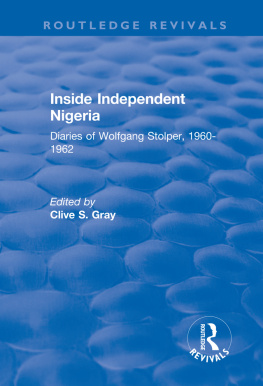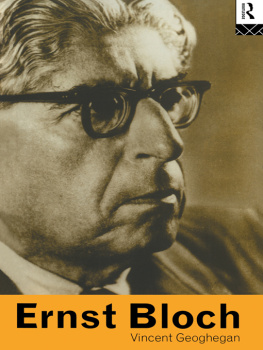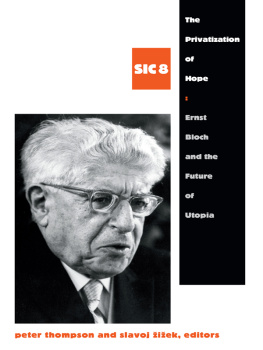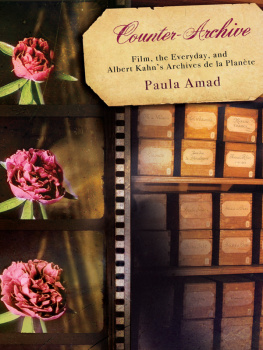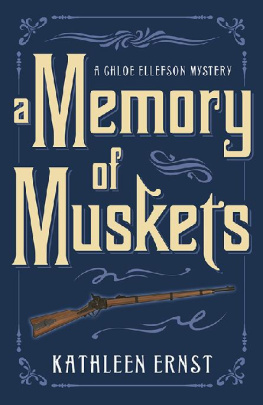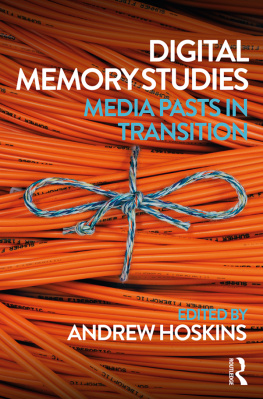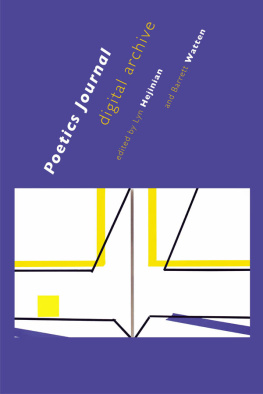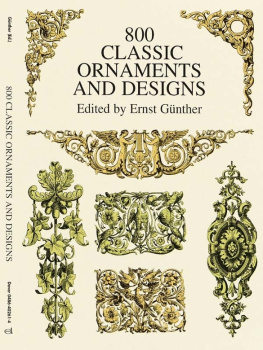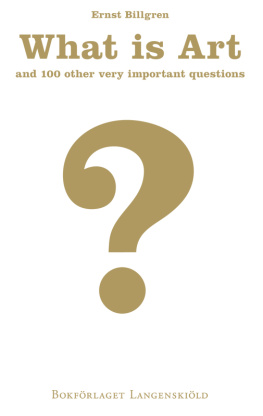Wolfgang Ernst - Digital Memory and the Archive
Here you can read online Wolfgang Ernst - Digital Memory and the Archive full text of the book (entire story) in english for free. Download pdf and epub, get meaning, cover and reviews about this ebook. year: 2013, publisher: University of Minnesota Press, genre: Art. Description of the work, (preface) as well as reviews are available. Best literature library LitArk.com created for fans of good reading and offers a wide selection of genres:
Romance novel
Science fiction
Adventure
Detective
Science
History
Home and family
Prose
Art
Politics
Computer
Non-fiction
Religion
Business
Children
Humor
Choose a favorite category and find really read worthwhile books. Enjoy immersion in the world of imagination, feel the emotions of the characters or learn something new for yourself, make an fascinating discovery.

- Book:Digital Memory and the Archive
- Author:
- Publisher:University of Minnesota Press
- Genre:
- Year:2013
- Rating:5 / 5
- Favourites:Add to favourites
- Your mark:
- 100
- 1
- 2
- 3
- 4
- 5
Digital Memory and the Archive: summary, description and annotation
We offer to read an annotation, description, summary or preface (depends on what the author of the book "Digital Memory and the Archive" wrote himself). If you haven't found the necessary information about the book — write in the comments, we will try to find it.
Digital Memory and the Archive — read online for free the complete book (whole text) full work
Below is the text of the book, divided by pages. System saving the place of the last page read, allows you to conveniently read the book "Digital Memory and the Archive" online for free, without having to search again every time where you left off. Put a bookmark, and you can go to the page where you finished reading at any time.
Font size:
Interval:
Bookmark:
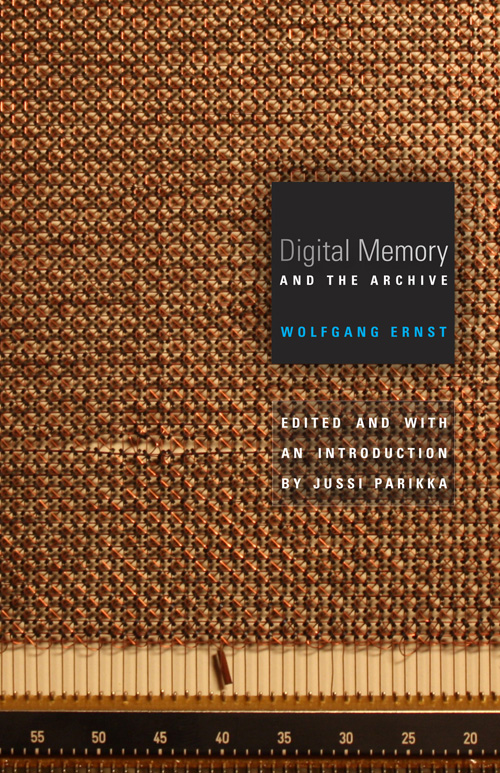
ELECTRONIC MEDIATIONS
KATHERINE HAYLES, MARK POSTER, AND SAMUEL WEBER, SERIES EDITORS
39. Digital Memory and the Archive
WOLFGANG ERNST
38. How to Do Things with Videogames
IAN BOGOST
37. Noise Channels: Glitch and Error in Digital Culture
PETER KRAPP
36. Gameplay Mode: War, Simulation, and Technoculture
PATRICK CROGAN
35. Digital Art and Meaning: Reading Kinetic Poetry, Text Machines, Mapping Art, and Interactive Installations
ROBERTO SIMANOWSKI
34. Vilm Flusser: An Introduction
ANKE FINGER, RAINER GULDIN, AND GUSTAVO BERNARDO
33. Does Writing Have a Future?
VILM FLUSSER
32. Into the Universe of Technical Images
VILM FLUSSER
31. Hypertext and the Female Imaginary
JAISHREE K. ODIN
30. Screens: Viewing Media Installation Art
KATE MONDLOCH
29. Games of Empire: Global Capitalism and Video Games
NICK DYER-WITHEFORD AND GREIG DE PEUTER
28. Tactical Media
RITA RALEY
27. Reticulations: Jean-Luc Nancy and the Networks of the Political
PHILIP ARMSTRONG
26. Digital Baroque: New Media Art and Cinematic Folds
TIMOTHY MURRAY
25. Ex-foliations: Reading Machines and the Upgrade Path
TERRY HARPOLD
24. Digitize This Book! The Politics of New Media, or Why We Need Open Access Now
GARY HALL
23. Digitizing Race: Visual Cultures of the Internet
LISA NAKAMURA
22. Small Tech: The Culture of Digital Tools
BYRON HAWK, DAVID M. RIEDER, AND OLLIE OVIEDO, EDITORS
21. The Exploit: A Theory of Networks
ALEXANDER R. GALLOWAY AND EUGENE THACKER
20. Database Aesthetics: Art in the Age of Information Overflow
VICTORIA VESNA, EDITOR
19. Cyberspaces of Everyday Life
MARK NUNES
18. Gaming: Essays on Algorithmic Culture
ALEXANDER R. GALLOWAY
17. Avatars of Story
MARIE-LAURE RYAN
16. Wireless Writing in the Age of Marconi
TIMOTHY C. CAMPBELL
15. Electronic Monuments
GREGORY L. ULMER
14. Lara Croft: Cyber Heroine
ASTRID DEUBER-MANKOWSKY
13. The Souls of Cyberfolk: Posthumanism as Vernacular Theory
THOMAS FOSTER
12. Dj Vu: Aberrations of Cultural Memory
PETER KRAPP
11. Biomedia
EUGENE THACKER
10. Avatar Bodies: A Tantra for Posthumanism
ANN WEINSTONE
9. Connected, or What It Means to Live in the Network Society
STEVEN SHAVIRO
8. Cognitive Fictions
JOSEPH TABBI
7. Cybering Democracy: Public Space and the Internet
DIANA SACO
6. Writings
VILM FLUSSER
5. Bodies in Technology
DON IHDE
4. Cyberculture
PIERRE LVY
3. Whats the Matter with the Internet?
MARK POSTER
2. High Techn: Art and Technology from the Machine Aesthetic to the Posthuman
R. L. RUTSKY
1. Digital Sensations: Space, Identity, and Embodiment in Virtual Reality
KEN HILLIS
Digital Memory and the Archive
WOLFGANG ERNST
Edited and with an Introduction by Jussi Parikka
Electronic Mediations, Volume 39
| UNIVERSITY OF MINNESOTA PRESS |
For publication information on previously published material in this book, see pages 24546.
Copyright 2013 by the Regents of the University of Minnesota
All rights reserved. No part of this publication may be reproduced, stored in a retrieval system, or transmitted, in any form or by any means, electronic, mechanical, photocopying, recording, or otherwise, without the prior written permission of the publisher.
Published by the University of Minnesota Press
111 Third Avenue South, Suite 290
Minneapolis, MN 55401-2520
http://www.upress.umn.edu
ISBN 978-1-4529-3395-5
The University of Minnesota is an equal-opportunity educator and employer.
CONTENTS
An Introduction to Wolfgang Ernsts Media Archaeology
Jussi Parikka
Traditionally, archives have had an interesting aura despite the grayness of the concrete walls surrounding them. We tend to think of archives as slightly obsolete and abandoned places where usually the archivist or the caretaker is someone swallowed up in the dusty corridors of bureaucracy, information management, and organizational logic that makes the archive a system. What characterizes such systems is that they are not always understandable or accessible to an outsider. We do not often visit archives, but the archives still have a keen interest in us. The Stasi archives, opened after the fall of the Berlin Wall and the German Democratic Republic in the early 1990s, are a case in point. Those archives recorded a large number of lives down to the most boring details, documented in meticulous fashion, including transcribed voice recordings as well as photographs. Getting to an archive is not always that easy, either. One needs to obtain permissions, make arrangements, follow strict rules of conduct, and get introduced to the whole system of how the archive has been organized. For sure, from a theoretical point of view, the postmodern theory surrounding amusement parks, visual culture, spectacle, and so forth was perhaps more exciting than focusing on the archive as a core site of modernity in its gray administration culture.
And yet suddenly archives are popping up everywhere. A lot of our software-based interaction online now has to do with archival metaphors. We see this in ways ranging from the replacement of Delete or Trashcan on our e-mail screens with Archive to attempts to offer new kinds of storage spacemistakenly conflated with archivesfor the numerous traces we leave of our personal livesphotographs, sound files, videos, documents. We are miniarchivists ourselves in this information society, which could be more aptly called an information management society. Hence we see the business of cloud storage, mobile storage, and such flourishing. We also see this in business models of social media: the so-called free platforms we are using to connect to friends and to share ideas, links, and preferences for films and music are all material for data mining, which is the new form of subsumption of our lives into capitalist production and accumulation of value. This algorithmic unconscious of social media cultures knows a lot about us and is often keen not only to keep but to sell those data to third parties.
The archive-oriented media theory of Wolfgang Ernst (1959) fits perfectly into the double bind of the modes of storage and transmission between old media and new media cultures. One of the last media theorists not to use a mobile phone, engage in any other form of the latest gadgetry, or even have a home Internet connection, Ernst is, however, completely up-to-date concerning the changes in our regimes of memory in software cultures. He is part of the breed of media theorists who are keen to do their own electronics, repair old media apparatuses, and browse through shops with old computers in order to find material for thought for, in Ernsts case, theoretical writings. Therefore, his way of mobilizing media archaeology into an analysis of the technics of cultural memory, analysis of the technical media machines of non-human kinds, and elaboration of theoretical ideas in digital humanities in medium-specific ways is at the same time something that feels new but is also recognizable to anyone who has at least a basic knowledge of some of the arguments of German media theory.
Font size:
Interval:
Bookmark:
Similar books «Digital Memory and the Archive»
Look at similar books to Digital Memory and the Archive. We have selected literature similar in name and meaning in the hope of providing readers with more options to find new, interesting, not yet read works.
Discussion, reviews of the book Digital Memory and the Archive and just readers' own opinions. Leave your comments, write what you think about the work, its meaning or the main characters. Specify what exactly you liked and what you didn't like, and why you think so.

